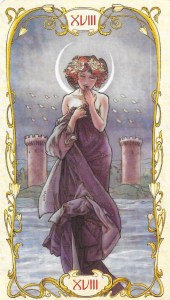
The Moon from the Mucha Tarot
Fear breeds in shadow.
The path seems lost in the dark.
Dawn illuminates.


The Moon from the Mucha Tarot
Fear breeds in shadow.
The path seems lost in the dark.
Dawn illuminates.
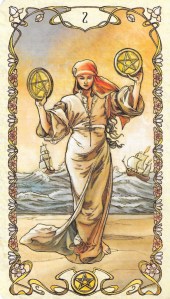
The Two of Pentacles from the Mucha Tarot
Efforts increasing
As new resources appear,
A balancing act.
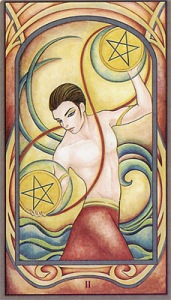
The Two of Pentacles from the Fenestra Tarot
Efforts increasing
As new resources appear,
A balancing act.
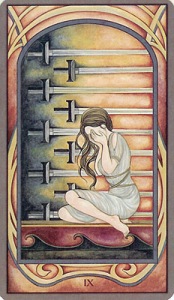
The Nine of Swords from the Fenestra Tarot
Sleepless night again.
Thoughts spiral and worries mount,
Fears grow unchallenged.
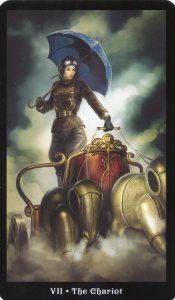
The Chariot from The Steampunk Tarot
Reins tight in my hands,
A new horizon beckons
As I push the pace.
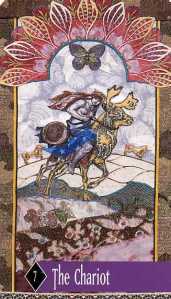
The Chariot from the Zerner Farber Tarot
Reins tight in my hands,
A new horizon beckons
As I push the pace.
Sunlight lingers on,
Shadows fall through the tall stalks
Still green and not ripe.
I love writing haiku. Not just because I have a short attention span, either. A good haiku is not about simplicity but about potency. By limiting verbiage and condensing a concept to its essence, it seems to allow for a pure experience of an awareness.
As something of an earth mama, I dig that traditional haiku typically includes a natural element (a seasonal reference, flora &/or fauna, planetary bodies, etc). That seems to ground the revelation in a real live moment, while simultaneously reaching to understand a force outside of the poet’s control.
In this haiku for the Seven of Pentacles, I wanted to capture the essence of the yearning for harvest – which is what this Seven reflects for me. It’s that time after hard work has been put into fields, but the crops have not yet fully ripened and the extent of the bounty (if any) is not yet known. Extending that metaphor into contemporary life, it signals a time of waiting on results – of working towards a goal while wondering (worrying?) about the payoff. I believe that there is always gain following good effort, but impatience often spoils the less obvious payoffs (experience, knowledge, facing your fears, accomplishment, etc). Too often we are waiting on the money and/or title following a great effort that we miss the real rewards of facing a challenge and completing a tough job.
I hope you like this little haiku. I intend to write more, maybe weekly. Or maybe just as often as the spirit moves me. I don’t expect that I’ll parse each one as I have done here today. I’ll leave it to you to experience the poem and have your own moment of revelation.
Namaste.
Sunlight lingers on,
Shadows fall through the tall stalks
Still green and not ripe.
“There seem to be only two kinds of people:
Those who think that metaphors are facts,
and those who know that they are not facts.
…Which group really gets the message?”
~Joseph Campbell~
I am extremely comfortable with metaphor. Not just as a Tarot reader but also as someone who spends a lot of time in the theatre, exploring subtext to illuminate collective truths is what I live to do. Presenting universal concepts through symbols and fantastical imagery is my jam. I love uncovering repressed wishes, recognizing – sometimes donning – archetypal masks, and revealing universal struggles. But sometimes I forget that not everyone expects metaphor when approaching the Tarot (or dream interpretation or astrology…or theatre, for that matter).
A lot of people are drawn to Tarot readings or astrology or dream interpretation for prognostication, wanting a clear definitive answer to a troubling question. Note that I didn’t say “solution” as that implies personal participation in the outcome. Honestly, many folk just want to hear that everything is going to work out in their favor without any effort on their part. They want to be told that the pictures on the Tarot cards or the stars in the sky or images in dreams guarantee a simply translatable, specific, certain conclusion.
That is an understandable impulse, but it doesn’t work that way. That kind of expectation leaves you powerless to fate, to others, to invisible forces (including your crippling fears and doubts and previous disappointments). To use a metaphor: it leaves you in the role of the helpless princess waiting to be rescued by some prince of destiny.
“Until you make the unconscious conscious,
it will direct your life and you will call it fate.”
~Carl Jung~
I was recently asked to do some dream interpretation readings as part of a fundraiser for one of my favorite Los Angeles theatres. I was surprised when some fellow thespians – metaphor professionals – seemed to fall into the familiar trap regarding symbology. “What does a jaw mean? I’ve had a bunch of dreams about my jaw.” “I don’t want to know what all the tornadoes mean, because it’s probably really bad.” “Isn’t it always about sex anyway?”
When it comes to interpreting visual imagery in dreams or cards, the process is personal and requires dialogue. There is no decoder ring that unlocks symbolic meaning. While the symbols in dreams and cards can be universal – like cigars, or dragons, or caves, or angels – what they represent from person to person is individual and must be interpreted in context.
I’ll use an example: behold the raspberry. A bright summer fruit enjoyed in desserts or cocktails, it may remind many folks of the simple sweetness of summertime. If offered in a dream, it could easily represent a delicious option, a sensual opportunity, etc. However, I have a very different reaction to raspberries. When I was growing up, there was a yearly Raspberry festival in a nearby town, and as a member of the marching band I had to participate in the parade. This was at the height of summer, our marching uniform was ridiculously heavy, and we marched for miles (it seemed). At the end of the parade, I was exhausted, sweaty, crampy, sunburned, and sticky with raspberry guts. Any raspberry that appears in my dream is likely to represent something deceptively sweet that comes with a cost or physical labor. That’s the difference personal context makes in interpretation.
And how about a Tarot example: the Lovers Tarot card. Of course it’s one of the cards most clients hope to manifest, but it doesn’t necessarily mean romantic love or even sexy times. At its essence, it’s about contracts. It’s about being clear about who you are and what you want and what you are willing to share for the benefits of the contract. And sometimes it means being clear about what is not included in the contract, too. It means setting terms and sticking to them for the mutual benefit of all parties involved. For some folks, this card will represent setting boundaries in romantic relationships. But once this card came up in a consultation with a client who was trying to negotiate some issues with a manager, and once it was even appropriate to describe a divorce settlement.
“If you want to change the world, you have to change the metaphor.”
~Joseph Campbell~
Can you believe: I’ve never had a single client who was satisfied with their life exactly as-is. Everyone is a work-in-progress, all my clients are on some kind of quest. Luckily, I find most folks attracted to my coaching style are eager to participate in their life. We can use the symbolic imagery of dreams to uncover your subconscious motivations or stumbling blocks. We can use the pictorial imagery of Tarot cards to make some choices about how to consciously move forward. We can work with the planets’ seasonal transits to embody the qualities of mythical characters represented in the stars. But let’s not accept passive prognostications. Let’s not wait around for life to happen to us. Let’s not try to live someone’s fairy tale.
Your personal myth is waiting for you!
“You are the Hero of your own story.”
~Joseph Campbell~
I saw The Hobbit last night and I had one of those tarot recognition moments. (Do you have those too? Or is it just me?)
This may be a bit of a spoiler technically, but you probably won’t be surprised to hear that early on in the story, the titular Hobbit Bilbo Baggins (played by my favorite charmer, Martin Freeman) is not interested in adventure. He likes his hobbit hole, with its stocked pantry and library of books and crocheted doilies. It’s cozy and warm and quiet, and his life is utterly self-contained. After an unexpected event with a bunch of loud and lively dwarves, the Hobbit summarily rejects the Wizard’s invitation to the quest. Not interested, not appropriate, not going to happen. And then he wakes up the next morning in his little peaceful hobbit house…with overwhelming need for adventure.
He races to join the dwarves and Gandalf. He knows the adventure guarantees nothing – not fame, not fortune. It doesn’t even guarantee his personal safety, he might not ever return to his hobbit hole. All he knows is that the quest will change him forever. And that’s what he is signing up for: evolution.
That, my dear readers, is the Fool card.
The Fool reflects that need to discover the world outside the world you have known.
The Fool card calls you to leave behind what is comfortable and cozy and self-contained for what is expansive and beyond your tribal experience. (Explore new territory, cross borders, introduce yourself to a new clan.)
The Fool reminds you that you don’t need a completely formed plan, but you do need a purpose. (Be inspired! Inspiration is calling you to a new adventure!)
The Fool requires you to travel light and trust that you will find what you need on your journey. (Let go of baggage, literal and metaphorical. Look forward, not back.)
The Fool represents your first steps on your very own Bohemian Path. (See what I did there?)
The Fool is also Dorothy when she tries to run away from the farm, and Luke Skywalker in the original Star Wars. The Fool actually appears in film a lot, often as the protagonist (and pretty much any time a main character leaves the family farm). But my favorite Fool in Film is now our Bilbo. In that moment captured in the picture above, you feel his thrill, his joy, his urgency. His change of heart reflects an awareness of his need to be a part of a new tribe, thrilled at the chance to discover the world, honoring the opportunity to find parts of himself that he never knew existed.
Of course, the Fool is an archetype, a metaphor. You don’t have to face down orcs or green witches or stormtroopers to have a Foolish experience, but you do have to honor inspiration and step out of your comfort zone. Dear reader, I hope in this new year you heed the Fool’s call and have your very own Unexpected Adventure.
I love this fabric:
There is a small tarot bag and a medium tarot bag over at my Etsy Store, BOHOquest.
And the copper one is sharp too. Both styles have a slightly metallic sheen to them. Nice, huh?
Have you seen the Tarot bag just for Aquarians over at BohoQuest?
Makes a great gift for your favorite Aquarian!